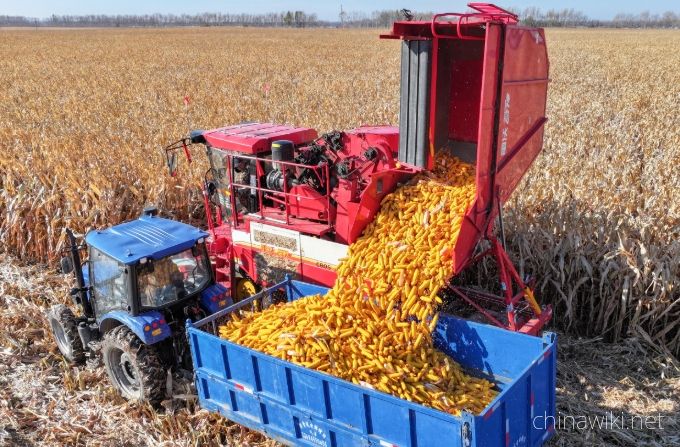2021-06-18

- By ChinaWiki.net
- Chinese Edition
- 2024-12-21
According to a report on the website of Singapore's Lianhe Zaobao on December 19, China will vigorously promote the increase of grain per unit area yield in a large area next year, consolidate the results of soybean oil seed expansion, and spare no effort to improve grain and oil production
According to Chinese state media reports, the National Conference of Directors of Agriculture and Rural Affairs was held on the 18th. The relevant person in charge of the Ministry of Agriculture and Rural Affairs of China said at the meeting that we must adhere to both improving yield and quality, and take the large-scale yield increase as a key measure for grain production
The person in charge also said that by 2025, we will consolidate the achievements of expanding soybean oil crops through multiple oil projects. Accelerate the promotion of high oil and high-yield soybean varieties, further tap the potential for rapeseed expansion, implement the action of improving peanut yield and quality, and expand planting through rotation, intercropping, etc. In addition, various regions should develop characteristic oil crops such as sunflower, sesame, oil tea, and walnut according to local conditions, and expand the supply of edible oil through multiple channels
According to the website of Hong Kong's South China Morning Post on December 20th, as China strives to achieve its goal of modernizing agriculture, the former pillar of its agricultural ecosystem - fertilizers - is gradually being replaced as China reimagines its way of growing food. People rely on smarter and easier to maintain farming methods to drive yields to historic highs while ensuring soil sustainability
The report states that the use of fertilizers in China has been declining for 8 consecutive years. According to data released by the National Bureau of Statistics, agricultural production in China has maintained stable growth year after year. In 2024, the grain output reached a record high of 706.5 million tons, an increase of 1.6% compared to 2023
Experts believe that this sustained growth is partly attributed to more precise application of fertilizers, ensuring the necessary nutrients are provided to the soil. In addition, improvements in seed quality, farmland conditions, and machinery have all played an important role in maintaining stable grain yields
Li Guoxiang, a researcher at the Institute of Rural Development of the Chinese Academy of Social Sciences, said that the steady increase in grain production is the result of various technological advances in agriculture. This cannot be achieved solely by one factor
The report states that in the face of increasingly severe challenges such as climate change and geopolitical tensions, China has been working hard to ensure food security while ensuring sustainable farming practices
In order to achieve the "basic modernization" of agriculture, the government has accelerated its investment in agricultural research and development in recent years, and these efforts seem to be paying off. The improvement of varieties and planting methods has promoted a stable increase in yield per hectare for some major products
The comprehensive mechanization rate of crop cultivation and harvesting in China has increased from 71% in 2021 to over 73% in 2023, which not only improves efficiency but also reduces food waste during transportation
According to the latest data from the National Bureau of Statistics, China's grain planting area reached 119319 thousand hectares in 2024, an increase of 1.4% compared to 2021 and maintaining growth for five consecutive years
According to reports, despite increasing investment and recent progress, experts point out that there is still a gap between China's agriculture and global leading countries such as Brazil and the United States
Li Guoxiang emphasized that in order to narrow the gap, China must cultivate more high-yield crop varieties and create resilient farmland that can withstand droughts and floods to cope with the challenges of extreme weather. He also emphasized the need for further reform of rural land policies to support more efficient and large-scale farming methods
Zheng Fengtian, professor of the School of Agriculture and Rural Development of Renmin University of China, also emphasized the importance of technological innovation in agricultural development. He emphasized the need to promote technological progress and improve land use efficiency, especially in underutilized areas such as vast grasslands and forests in China, in order to reduce dependence on imported agricultural products
Zheng Fengtian used the breakthrough in crop breeding in the desert areas of Xinjiang as an example to illustrate the diversification of arable land. The progress in greenhouse construction has made rice cultivation possible
Zheng Fengtian said, "China has a vast territory, and most areas still have untapped potential for agricultural production and strengthening food security. Technology is the key to unleashing this potential
Ask a Question
Your email address will not be published.




0 Questions